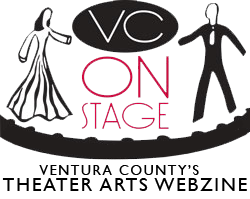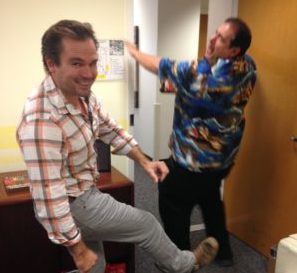BY CARY GINELL
Tonight, friends and colleagues will pay tribute to Lewis Wilkenfeld at a special fundraising banquet and program honoring his 10 years as artistic director of Cabrillo Music Theatre. Wilkenfeld has turned over the reins to incoming managing director Will North. The event takes place at the Palm Garden Hotel in Thousand Oaks. A few weeks ago, we met with Lewis to talk about his years with Cabrillo as well as to find out about what’s next for him in the next act of his life in the theater.
VCOS: One thing people are interested in knowing about your departure from Cabrillo is, why now? You had just gone through several desperate fund-raising efforts for the company, which just barely survived. But all is well and Cabrillo is moving on, but without you. What’s the story behind your leaving?
LEWIS: Well, they’re all linked, and I think this is a fair way to answer this question. The board and I looked at what the future was looking like and we initially made a decision not to move forward with next season. Obviously, new funding came in, and at that point, the board and I diverged on whether that was enough support to move ahead. But really, for me, it came down to something more personal in that, if I’m going to be the guy who is staying, I’m going to continue being the guy in the crosshairs who takes the most pressure if we go through another crisis. So I made the decision based on my personal health and my psychological health that even though the numbers added up for the board to move ahead, for me, I couldn’t afford for it to happen again.
VCOS: Would you have stayed if your responsibilities had changed?
LEWIS: Well, that wasn’t going to happen. If I were to stay, I would be doing what I was doing, and hopefully, things would go in a better direction, but if they didn’t, and if for some reason the board was wrong and we were faced with another crisis six months from now or a year from now, it would still be on me. So if I’m still here, I’m still the guy standing on stage asking for money. And I’m still the guy going to our few generous donors asking for support, I’m the guy doing interviews with the papers saying this, and I just can’t keep being that guy.
VCOS: Would you have been happy staying in a strictly creative role?
LEWIS: Yes, I would have, but as a guy who’s psychologically invested in the company, I can’t just do that and let the company go where it wants to go. If I’m working on the shows as artistic director, on some level, I’ve got to have a dog in the hunt on whether it’s going to survive or not. It would be great if we were in a position where if the person on the artistic side of the company could just focus on that, but we haven’t been in that position for five years, and in reading the tea leaves, it didn’t look like that position would change any time soon.
VCOS: Is this the way it is with most community theater companies?
LEWIS: I cannot attest to any other companies, I can only say that many struggle, some make transitions, many have closed, and I think the conditions that Cabrillo faces are not unique. There are certain aspects that ARE unique, but in terms of fundraising challenges and developing new generations of theater audiences who will commit to a company, those are universal issues. And I have to say, as I say all this, that I applaud the board of directors for moving ahead. The fact that I personally couldn’t be the front man for it speaks more to my level of exhaustion or my feeling that I’ve run my course, but I think they’re doing a valiant job working very, very hard, and I support all of them, and I hope, hope, hope that Cabrillo is turning the corner and will find the support it needs in both ticket sales and fundraising to keep moving ahead.
VCOS: As far as your future association with Cabrillo, what will that look like?
LEWIS: Well, all things being equal, I’m supposed to come back next summer to direct Peter Pan, a show that I hold very close to my heart. I’m also supposed to put up the naval base show again. That’s a commitment I made to the community back when we were talking about shutting our doors. I said that even if we stop, I want to do the naval base show. And so even if Cabrillo is moving ahead, the board has indicated an interest in me playing a role in that and I’ll fulfill that. I love doing that. And I’m always a phone call away from anybody who needs to ask a question, like “Lewis, why did we not do it this way before?” That’s usually what I get asked now. I’m “the old guy.”
VCOS: Is there a scratch pad somewhere that had a list of things on it that you wanted to accomplish at Cabrillo before you left that you were never able to do?
LEWIS: Oh, absolutely. Yes. Developing an education program was really high on our list. We did some master classes but we were limited by our resources, by rehearsal space limitation, and by staff resource limits, but I would have liked a robust education program, of which Cabrillo Teen Project was a part of that, but would offer lots of different classes for kids and teens. That’s how I started, in a company similar to this in Houston, Texas. Obviously, I would have liked to have seen a wider variety of shows to engage our community. You always look back and say, “God, I wish that had sold.” It breaks my heart that we worked so hard on some of these. We still talk about Jekyll and Hyde, which is one of those.
VCOS: Is that the one that broke your heart the most?
LEWIS: No. Children of Eden broke my heart the most, because at a time when Cabrillo really needed the support of the community, I was hoping that they would have really come and rallied, but I directed that one, so I had more vested interest in it. Jekyll and Hyde was a show where more people complimented me on it than actually saw it. And it’s a testament to the fact that we are always a servant to the master that is the audience, their tastes, their inclinations, and their desires. There’s no shoveling something down everybody’s throat, there’s no justification for doing something if there isn’t somebody on the other side of the footlights who wants to see it. If they’re telling you something, that’s what they’re telling you. It’s like the gag on 30 Rock, the guy who’s selling pagers after pagers were out of business. I can keep selling pagers, but if the audience doesn’t want to buy pagers, I should maybe take the hint. So I love the shows that sell, but I also love the shows that don’t sell. I’m proud of our artistic successes that weren’t financial successes and I’m proud of our financial successes that weren’t artistic successes. But the opportunities for what kinds of shows that can be done are narrowing and narrowing and narrowing. That’s a challenge that all theater companies are facing, phasing out the classics at a quicker rate than we would like.
VCOS: Did you expect Jekyll and Hyde to work?
LEWIS: We did, because it worked everywhere else. It’s a show that managed to sell everywhere but Thousand Oaks.
VCOS: And that was a show that audiences were unfamiliar with, but then you turn around and do something like In the Heights, and in worked.
LEWIS: Well, we brought in a marketing consultant for In the Heights. We started to learn, finally, and put money where we needed to a little bit more, so we brought in someone who worked with us from In the Heights through the end of this season. You can really see his impact on shows like In the Heights, on Memphis, which became a big box office success, and then in promotion for shows like Mary Poppins and The Little Mermaid.
VCOS: Is there a difference in the demographics between season ticket holders and walk-ups?
LEWIS: Absolutely. Walk-ups generally are younger. There is an entire generation that is our age and younger than our age that doesn’t want to commit to a full season. And it has to do more with their lifestyle than the money; they don’t know what their kids are going to be putting them through, they don’t know what their lives are going to be like in a year, there’s a lot of financial turmoil out there. I’m a member of three different theater companies now because I believe that as crazy as my lifestyle is, it helps me that I can pick up the phone or go to the box office if I need to move to another day, which is still better than standing in line and paying the higher prices and dealing with credit card charges over the phone. For my chaotic lifestyle, it’s more convenient. But yes, it’s generational. I remember when our kids were little, we didn’t even want to commit to having dinner with friends, much less reserving three evenings of theater over the course of a year. So I get it, but it makes it hard for us to do shows that don’t have mermaids and flying nannies built into them. Don’t get me wrong. I love those shows; I directed Mary Poppins, but I love the other stuff too. I still have people coming up to me to talk about Children of Eden, A Funny Thing Happened on the Way to the Forum, and Jekyll and Hyde. Somebody will come to me and tell me about just every one of the 42 shows I did, and they will say, “You know what my favorite show was?” A couple of weeks ago, it was Ring of Fire, the music of Johnny Cash. That was their favorite show.
VCOS: Do you have one that was your favorite?
LEWIS: I have two children and I won’t choose between them and I had 42 theater children and I wouldn’t choose among them either. As you know, I’ve been writing down my autobiography on Facebook, bit by bit, show by show, so you see my reflections on each show there.
VCOS: I know how you feel. When people ask me what kind of music is my favorite, I always tell them, whatever I’m listening to at the moment.
LEWIS: There you go. And we’ve done shows that are not my personal favorites, but I was really, really proud of those productions. There were a few where I said to myself, “Gee, I sure would like to have another whack at that.”
VCOS: OK, instead of asking about your “favorite,” tell me what was the most amazing technical stunt you were able to pull off in a show?
LEWIS: Oh, man, I might even have a tie there! I think that the transition in Cinderella looked so cool, but it was so simple. It didn’t use hydraulics and explosives and things like that, it was really simple, dealing with things going on on stage, and diversion of focus. I think that because of the simplicity of that, I would choose that one, but I know everyone is still talking about the walk across the ceiling in Mary Poppins, which was literally done with a gadget that was rented, taught to us, and then executed incredibly well by Wesley Alfvin, who played our Bert, and Scott, the guy off-stage operating it. But that came already invented. We invented the Cinderella thing. There were some cool effects in Jekyll and Hyde and some pyrotechnics in other shows. Our Cats came fully loaded. We did everything that you can do with Cats.
VCOS: So next summer, you’ll be working on “pirate-technics” for Peter Pan, right?
LEWIS: There you go! Pirate-technics! I like that. And I look forward to getting back to the core of that show as well. I’ve never been blown away by technology in storytelling anyway. My favorite scene in The Little Mermaid is a scene that was not in any other production and is not written in the script. The director, Larry Raben, and the choreographer, Heather Castillo, came up with it because they had a beach location where Ariel and Prince Erik leave the banquet room where they’re getting to know each other, and they moved it to the beach. And Heather choreographed it with Larry and the two actors with such nice, organic movement, it was warm, character-driven storytelling, just two kids, barefoot on a beach, falling in love with each. And it was my favorite moment in that show, and it had no special effects. That’s the one I’ll carry to my grave. In that show, it’s that scene. It’s not the “BAM! POW! TECHNOLOGY! SPLAT!”
VCOS: Were there any big, flop-sweat disasters that happened right before your eyes on stage?
LEWIS: In one of my shows? Ooh, I don’t know if I want to “out” that. Umm. We’ve had some scary moments where we couldn’t crack the code technically. It’s always something technical because we have so little actual theater time to rehearse. We do this in too tight of a schedule. We rehearse in a rehearsal hall for five weeks and by the end it’s running perfectly. But when you get into the theater, you’re at the mercy of the folks you rent the scenery from. Did they include all the equipment? Did it come with screw eyes? Did the harnesses arrive? Is there a panel missing? I remember on The Andrews Brothers, a third of the set never even arrived and we found out that it had been left in other warehouses by other theater companies. Fortunately, we had good relationships with all of them. A friend of mine drove up from the Lawrence Welk resort with a big chunk of the scenery and somebody else drove up from Fullerton’s Civic Light Opera with another piece from the show. So it just drifted in all week and we finally were able to put it together. Every time we build a new set, it’s harrowing, and that’s just because in the time we have in the theater, we really don’t have the time to do it right, with the exception of Children of Eden, where we scaled our expectations to match the time. So, rather than over-design, we kept it really simple so we could execute it in the amount of time we had. But the other shows we tried to build have been scary only because of the technical aspects and not having enough time in the theater to do it right.
VCOS: Do you see yourself ever doing “this” again for another company?
LEWIS: No. Cabrillo was such a good match for me. I had already been here for ten years as a director, so I knew the people, I knew the community. Being reintroduced to a Harry Selvin or somebody like that, I didn’t have to do that. They knew of me and I knew of them. It would be much harder to go to a new city and learn who is the Harry Selvin of that city. Getting to know all that might be hard for me without some strong backing on the business side. But I could see myself running a theater company or collaborating with others to rent a theater company. I don’t know. My interests now are there and are certainly artistic, but also, I want to figure out a way to help the Southern California theater community get through some of the turbulence it’s going through currently, including some of the stuff we talked about. Finding the audience. Engaging a new generation. But also the challenges facing theaters of different sizes in Southern California, developing more work for professional actors. I just would like to take the work that I’ve done at Cabrillo and expand it by. By working with one single theater, I don’t think I can expand it. I’m now a member of the Ovation rules committee for the L.A. Stage Alliance and that gives me the opportunity to get involved in a different side of the theater community. I’m on the board of directors of Musical Theatre Guild, a company I’m a big fan of; I’m a subscriber and I’ve directed ten shows for them. I love these guys. What they do is great. Of course, they used to do it out here and it’s a loss for the community that they’re not out here anymore, but they still do a season at the Alex and I want to see them keep doing what they do because it’s unique. Where else are you going to go see Promises, Promises or Wonderful Town or Girl Crazy? If Musical Theatre Guild doesn’t do it, who will? So I like being part of those things. And I’ll find other stuff to do. I’m working with some writers on new musicals and developing new projects that will hopefully bring more work for actors and more opportunities for theater companies.
VCOS: Your Facebook posts kind of made me wonder if you would ever publish your experiences in a book, memoirs not only about the crazy things that have happened in your career in community theater but to help educate other directors and producers on all the pitfalls and how to do community theater.
LEWIS: I’ve got to believe that people are reading these because they are presented in really small doses. I haven’t led a life that is book worthy, so I’m kind of sneaking up on everybody by letting them read my book one page at a time. I’m a writer at heart. I love writing and so I would love to put together thoughts and essays. I’m documenting everything as I post it so I can easily access it. It helps me that I started really at the bottom of so many different places. I didn’t just fall into this job and I didn’t get into this job as a young man. I was already in my mid-40s when I was hired. And I think that helped me, too because the folks that I watched struggle with these things in other regional theaters are those who did not have the background. Serena and I were talking about that over dinner last night. A friend of ours wants to get into casting. He’s an actor who wants to make that transition, and I told him that people who worked in casting directors offices helped me in this job so much. But you had to have gone down that road and learned from these casting directors, learning how casting works, how contracts work, the process, and then you can bring that to your next stage. I’m trying to document it all and for each show, I try to find the angle that made it work. Sometimes it’s pure nostalgia, sometimes it’s making the best of a difficult situation. Maybe someone will want to read it, I don’t know. I’ll be happy if my kids read it.
VCOS: Well, speaking for the community, I hope you will stay close to our backyard.
LEWIS: Yes, Broadway in your backyard. I am never that far away. I’ve had an amazing ten years, as I’ve said in every interview. But to be able to do what you were put on this earth to do, for any length of time, is a blessing, because a lot of people never get that exact thing. This was that exact thing. It was under difficult circumstances, but there was way more joy than difficulty. And If I could physically and psychologically take it for longer, I would have. But ten years is a good, round number.
*****************
Cabrillo Music Theatre’s 2016 – 2017 season begins with its production of Evita, which opens on October 14 at the Thousand Oaks Civic Arts Plaza. For dates and showtimes, see the VC On Stage Calendar.






No Comments